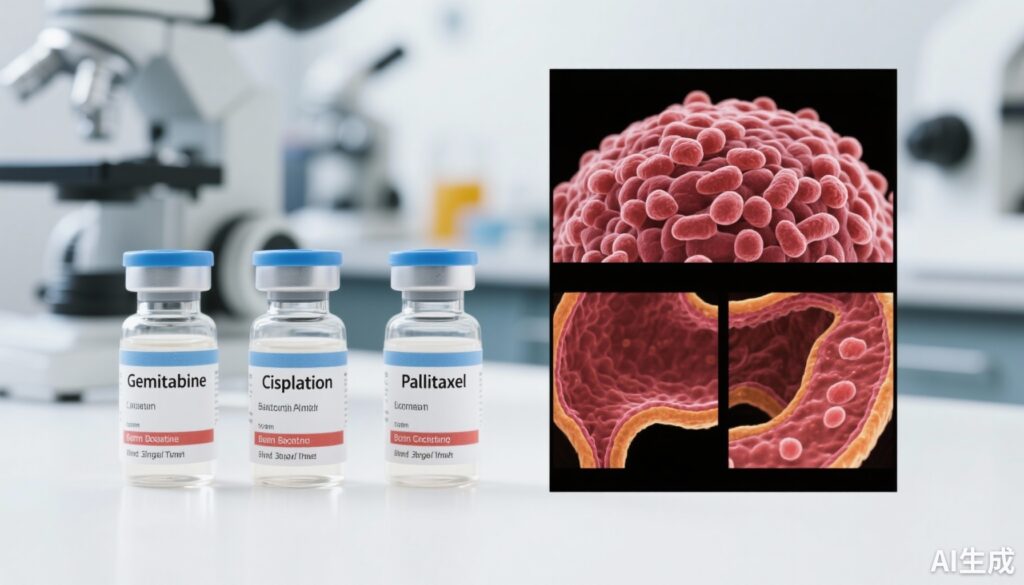Highlight
– Adding polymeric micellar paclitaxel to gemcitabine and cisplatin chemotherapy did not significantly improve overall survival in advanced biliary tract cancer.
– The study was conducted in a predominantly Asian population across seven centers in South Korea.
– Progression-free survival and objective response rates were also similar between treatment groups.
– No unexpected safety concerns emerged from the intensified chemotherapy regimen.
Study Background and Disease Burden
Biliary tract cancers (BTCs), including cholangiocarcinoma and gallbladder cancer, represent aggressive malignancies with generally poor prognoses. Globally, BTCs are relatively uncommon but have higher incidences in East Asia, including South Korea, largely due to regional risk factors such as chronic inflammation of the biliary tree and liver fluke infections. Advanced BTC carries limited treatment options, with median survival often under 12 months despite chemotherapy.
Standard first-line systemic therapy for advanced BTC has long been the combination of gemcitabine and cisplatin, which improves survival compared with gemcitabine alone. However, outcomes remain suboptimal, driving investigation into intensifying chemotherapy by adding agents such as taxanes, which have shown activity in various gastrointestinal cancers.
Taxanes like paclitaxel stabilize microtubules, inhibiting cell division, and can potentially enhance cytotoxic effects when combined with gemcitabine and cisplatin. However, standard paclitaxel formulations include polyethoxylated castor oil, which can cause hypersensitivity reactions and limit dosing. A novel polyethoxylated castor oil-free polymeric micellar formulation of paclitaxel may improve delivery and tolerability, but its efficacy in BTC remained unclear prior to this study.
Study Design
This open-label, phase 3 randomized clinical trial was conducted across seven tertiary centers in South Korea from September 2019 through October 2022. Eligibility criteria included adults aged 19 to 79 years with previously untreated locally advanced unresectable, recurrent, or metastatic adenocarcinoma of the bile duct, with measurable or evaluable lesions as per RECIST version 1.1. Patients had to have an Eastern Cooperative Oncology Group performance status of 0 to 2.
Participants were randomized to receive either:
- Polymeric micellar paclitaxel 100 mg/m2, gemcitabine 800 mg/m2, and cisplatin 25 mg/m2 on days 1 and 8 every 21 days
- Or gemcitabine 1000 mg/m2 and cisplatin 25 mg/m2 on days 1 and 8 every 21 days (standard regimen)
Both regimens planned up to nine cycles of therapy, barring progression or unacceptable toxicity.
The primary endpoint was overall survival (OS). Secondary endpoints included progression-free survival (PFS) assessed by both investigators and blinded independent central review, objective response rate (ORR), and safety profile.
Key Findings
A total of 150 patients were randomized: 74 in the triple-combination group and 76 in the standard gemcitabine and cisplatin group. The median age was 65 years, with 58% males. Due to slow accrual, the study terminated prematurely. Median follow-up was 10.4 months.
Median OS was 12.0 months (95% CI: 9.9-15.8) for the polymeric micellar paclitaxel group versus 11.1 months (95% CI: 9.7-13.5) in the standard group, with a hazard ratio of 0.94 (95% CI: 0.63-1.41; P=0.76), indicating no significant survival benefit from adding paclitaxel.
Progression-free survival also showed no significant differences between groups, based on both investigator and central review assessments. The objective response rate was similar between both arms, with no statistically significant improvement.
Safety profiles were acceptable in both groups, with no new safety signals reported. The addition of polymeric micellar paclitaxel did not markedly increase severe toxicities, suggesting tolerability of the intensified regimen.
Expert Commentary
This study provides important prospective evidence regarding the utility of adding taxane chemotherapy to the established gemcitabine-cisplatin backbone in advanced BTC, particularly in Asian populations where the incidence is highest.
Despite the theoretical rationale that intensified chemotherapy with an additional cytotoxic agent like taxane would improve outcomes, this trial demonstrates a lack of survival benefit and comparable progression-free survival and objective response rates. These findings align with prior smaller or retrospective analyses that question the benefit of intensified chemotherapy in this setting.
The novel polymeric micellar paclitaxel formulation offers improved formulation-related tolerability but did not translate into efficacy gains. The premature study closure due to slow recruitment somewhat limits power, but the observed effect sizes suggest a true lack of clinically meaningful benefit.
These results underscore the unmet need for more effective systemic therapies for advanced BTC. Future approaches may include targeted therapies based on molecular profiling, immunotherapy combinations, or biomarker-guided treatment strategies rather than conventional chemotherapy intensification.
Conclusion
This rigorous phase 3 randomized trial in South Korean centers concludes that the addition of polymeric micellar paclitaxel to standard gemcitabine and cisplatin chemotherapy does not confer a survival advantage or improved disease control in patients with previously untreated advanced biliary tract cancer. The safety profile was acceptable, but intensified cytotoxic chemotherapy with taxanes appears limited in efficacy for this malignancy.
This study contributes valuable data to clinical decision-making, reinforcing gemcitabine and cisplatin as the frontline standard of care and supporting the ongoing pivot toward precision medicine and novel therapeutic targets in BTC management.
References
- Jeong H, Yoo C, Kim I, et al. Gemcitabine and Cisplatin Plus Polymeric Micellar Paclitaxel and Survival in Advanced Biliary Tract Cancer: A Randomized Clinical Trial. JAMA Netw Open. 2025;8(10):e2534560. doi:10.1001/jamanetworkopen.2025.34560
- Valle JW, Borbath I, Khan SA, et al. Biliary tract cancer: ESMO Clinical Practice Guidelines for diagnosis, treatment and follow-up. Ann Oncol. 2021;32(9):1168-1180. doi:10.1016/j.annonc.2021.06.019
- Chen M, Konishi T, et al. Advances in systemic therapy for cholangiocarcinoma. Ther Adv Med Oncol. 2022;14:17588359221099385. doi:10.1177/17588359221099385



